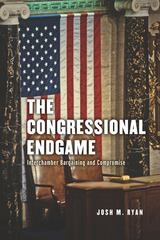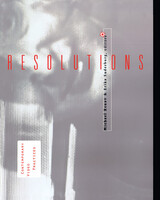2 books about Resolutions

The Congressional Endgame
Interchamber Bargaining and Compromise
Josh M. Ryan
University of Chicago Press, 2018
Congress is a bicameral legislature in which both the House and Senate must pass a bill before it can be enacted into law. The US bicameral system also differs from most democracies in that the two chambers have relatively equal power to legislate and must find ways to resolve their disputes. In the current landscape of party polarization, this contentious process has become far more chaotic, leading to the public perception that the House and Senate are unwilling or unable to compromise and calling into question the effectiveness of the bicameral system itself.
With The Congressional Endgame, Josh M. Ryan offers a coherent explanation of how the bicameral legislative process works in Congress and shows that the types of policy outcomes it produces are in line with those intended by the framers of the Constitution. Although each bargaining outcome may seem idiosyncratic, the product of strong leadership and personality politics, interchamber bargaining outcomes in Congress are actually structured by observable institutional factors. Ryan finds that the characteristics of the winning coalition are critically important to which chamber “wins” after bargaining, with both conference committees and an alternative resolution venue, amendment trading, creating policy that approximates the preferences of the more moderate chamber. Although slow and incremental, interchamber negotiations serve their intended purpose well, The Congressional Endgame shows; they increase the odds of compromise while at the same time offering a powerful constraint on dramatic policy changes.
With The Congressional Endgame, Josh M. Ryan offers a coherent explanation of how the bicameral legislative process works in Congress and shows that the types of policy outcomes it produces are in line with those intended by the framers of the Constitution. Although each bargaining outcome may seem idiosyncratic, the product of strong leadership and personality politics, interchamber bargaining outcomes in Congress are actually structured by observable institutional factors. Ryan finds that the characteristics of the winning coalition are critically important to which chamber “wins” after bargaining, with both conference committees and an alternative resolution venue, amendment trading, creating policy that approximates the preferences of the more moderate chamber. Although slow and incremental, interchamber negotiations serve their intended purpose well, The Congressional Endgame shows; they increase the odds of compromise while at the same time offering a powerful constraint on dramatic policy changes.
[more]

Resolutions
Contemporary Video Practices
Michael Renov
University of Minnesota Press, 1995
Explores the state of the art, practice, and theory of video.
Here is, by far, the best, boldest, and most thorough account to date of video art and activism, practice and theory. The long-awaited follow-up to a project conducted by Los Angeles Contemporary Exhibitions (LACE), this volume comprises original articles by many of the most interesting video artists, filmmakers, and critical theorists writing today. Their subjects, from video pedagogy to emerging technologies, are many and varied and together constitute a clear and complete picture of the state of the medium.
Constructed like an inquiry into newly forming video practice, the collection at once interweaves and questions a series of relationships among politics, popular culture, artistic intervention, and social practices of the media. The often provocative essays, on topics ranging from video porn to Geraldo Rivera to lesbian representation to the politics of video memory, contribute significantly to a much-needed reconceptualization of the electronic medium.
"Resolutions is a collection of 24 essays that span the broad realm of video today, considering practices both within and outside the territory of fine art." Guggenheim Magazine
"This volume provides valuable insight into the innovative practices which are helping to shape video making. If you find yourself wondering about the art of video, the state of the medium, where it's all going, you'll find this collection of essays both informative and thought provoking." Journal of Educational Media
"This work offers an up-to-date account of video art and activism, practice and theory. The work focuses on the technical political, social and esthetic dimension of the medium, interweaving description of past events and projects with state-of-the-art consideration of technologies and direction of change. This work is very likely to become the essential text to begin to understand this widely transitional art style. Highly recommended." The Reader's Review
Contributors: Rosanna Albertini, Raymond Bellour, John Belton, Gregg Bordowitz, Ron Burnett, Jacques Derrida, Sara Diamond, Monica Frota, Bill Horrigan, David E. James, Laura Kipnis, Tetsuo Kogawa, Judith Mayne, James Moran, Michael Nash, Chon Noriega, Bérénice Reynaud, Marlon Riggs; Marita Sturken, Christine Tamblyn, Maureen Turim, and Patricia Zimmermann.
Michael Renov is professor of critical studies in the School of Cinema-Television at the University of Southern California. He is the author of Hollywood's Wartime Woman: Representation and Ideology (1988), and the editor of Theorizing Documentary (1993). Erika Suderburg is a video artist and associate professor in the Department of Art at the University of California, Riverside.
[more]
READERS
Browse our collection.
PUBLISHERS
See BiblioVault's publisher services.
STUDENT SERVICES
Files for college accessibility offices.
UChicago Accessibility Resources
home | accessibility | search | about | contact us
BiblioVault ® 2001 - 2024
The University of Chicago Press









